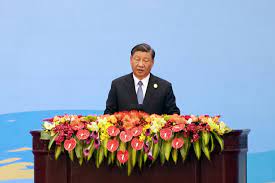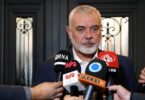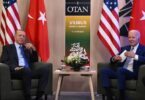BEIJING (Reuters/AFP): Chinese President Xi Jinping warned against decoupling from China as he opened the Belt and Road Initiative (BRI) forum in Beijing on Wednesday, criticising Western efforts to reduce dependence on the Chinese economy.
Xi also lauded his grand plan launched 10 years ago of building global infrastructure and energy networks connecting Asia with Africa and Europe through overland and maritime routes, saying that “blueprints turned into real projects”.
Representatives of more than 130 countries, largely from the Global South, attended the forum including several heads of state, of whom the most prominent was Xi’s “dear friend” Russian President Vladimir Putin.
“We stand against unilateral sanctions, economic coercion, decoupling and supply chain disruption,” Xi told more than 1,000 delegates gathered in an ornate conference room in the Great Hall of the People west of Tiananmen Square.
Putin and other foreign leaders sat with key Chinese officials from the 25-member Politburo on the front row, as Xi delivered his opening remarks.
Xi opened the forum with a speech promising Beijing would not engage in “ideological confrontation, geopolitical games or bloc confrontation”.
“We oppose unilateral sanctions, economic coercion, decoupling and delinking,” Xi told delegates.
“Viewing the development of others as a threat and economic interdependence as a risk will not make one’s own life any better or one’s own development any faster.”
Instead, Xi said, the Belt and Road Initiative (BRI) would seek to “inject new impetus into the global economy”.
“The BRI aims to enhance policy, infrastructure, trade, financial and people-to-people connectivity,” he said.
“We deeply believe that only when there is win-win cooperation can things get done, and get done well,” he added.
“China is willing to deepen cooperation with Belt and Road partners… and work unremittingly to realise the modernisation of every country in the world.”
“Jointly building the Belt and Road originated in China, but its achievements and opportunities belong to the world,” he said.
Xi pushed against Western efforts to reduce dependence on Chinese economy, saying that, “our lives will not be better and our development will not be faster if we view the development of others as a threat and economic interdependence as a risk.”
Reducing their dependence on supply chains with China has become a top priority among Western economies as Beijing’s threats to Taiwan heighten geopolitical risks in Asia. The trade disruptions of the pandemic years have also added urgency to the desire to limit their dependence on China.
Although BRI at first set out to connect China to Western Europe, senior EU figures were missing. The sole head of state present from the bloc was Hungary’s populist President Viktor Orban. Other notable attendees included the Afghan Taliban administration’s commerce minister Haji Nooruddin Azizi.
“China has more interest right now in developing Afghanistan at this moment, so we are more engaged with China. The Chinese have more interest in economic affairs, that’s why we’re here,” Azizi told a gaggle of reporters at the ceremony.
WESTERN SCEPTICISM
Western scepticism of Xi’s grand plans stems from suspicions over the way it would extend China’s global influence, analysts say. China has at times bristled at criticism of the BRI, saying it carries anti-Chinese prejudice and a wish to contain its rise, while overlooking what it says are genuine good intentions.
In an address that followed Xi’s, Putin praised the BRI and invited global investment in the Northern Sea route which he said could deepen trade between east and west. Several European officials left the hall as Putin took to the stage.
Xi is making the Belt and Road smaller and greener, moving away from big-ticket projects like dams to high-tech ones such as digital finance and e-commerce platforms.
The aim is to aid a broader push for a world order that is multi-polar and gives the Global South more agency, rather than one dominated by Washington and its allies, analysts say.
The BRI has also become more focused on issues such as climate change and artificial intelligence, as Xi seeks to use it to export Chinese ideas about governance and build consensus around Chinese norms and its development model, analysts say.
On Wednesday, Xi reinforced those trends, pledging to “deepen cooperation in green infrastructure, energy and transportation,” and “put forward global initiative for artificial intelligence governance.”
A European business representative, who did not want to be named for sensitivity reasons, said on the sidelines of the ceremony that BRI was, “creating impact for some of the countries involved” and that, “I think there is some truth to some of the speeches about improving livelihood and connectivity.”
WORLD LEADERS
Xi welcomed Putin to Beijing on Tuesday at an event kicking off the forum, shaking hands and exchanging pleasantries.
They also took part in a group photo with other leaders attending the summit.
At an official banquet, Xi delivered a toast in which he alluded to recent geopolitical conflicts, but added that “the historical (trend) of peace” was “unstoppable”.
Putin is due to hold in-depth talks with Xi on the sidelines of the forum on Wednesday, the Kremlin said, with the war raging between Israel and Palestinian militant organisation Hamas looming large over the summit.
The United States has asked China to use its influence to help de-escalate the war, which has seen more than a million people in the blockaded Gaza Strip flee the relentless bombardment that Israel launched in retaliation for the attack.
China brokered an entente between key Hamas backer Iran and its regional foe Saudi Arabia earlier this year, and will send its Middle East envoy Zhai Jun to the volatile region this week.
Russia, which has traditionally maintained good relations with both Israeli and Palestinian authorities, has called for an “immediate ceasefire” in the conflict.







